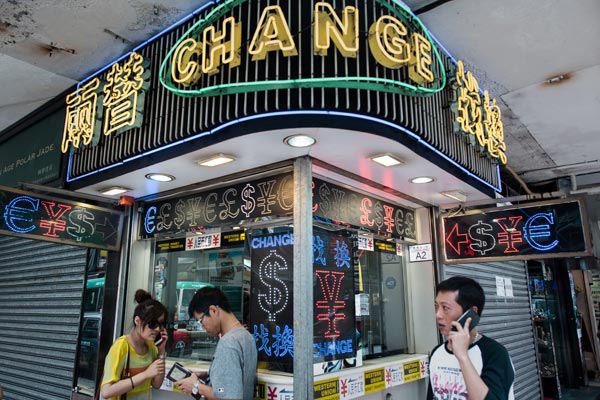|
 |
|
?A currency exchange booth in Hong Kong. The special administrative region is the world's largest offshore yuan market, where deposits of the currency have exceeded 1.1 trillion yuan, about half of the total offshore yuan globally. |
China's cross-border trade settled in the yuan will likely double in the next five to seven years, which will generate opportunities for financial institutions in offshore markets for the currency, a senior monetary official from Hong Kong said on Friday.
Chan Tak-lam, chief executive of the Hong Kong Monetary Authority, said that he expected financial institutions in Hong Kong to introduce more yuan-denominated products to meet investors' demand for the yuan.
Sales of products such as exchange-traded funds associated with the Chinese mainland's A-share market are growing rapidly, he said.
Yuan-denominated foreign trade accounts for 15 to 20 percent of the country's total trade and that percentage will likely rise to 40 to 50 percent, indicating more acceptance of the yuan among international traders and investors, Chan told a news conference in Beijing after meeting with mainland regulators.
From January to October, yuan-denominated trade settlement in Hong Kong grew significantly. Offshore yuan trading doubled to the equivalent of $30 billion in the same period, Chan said.
Demand for offshore yuan increased after last Monday's launch of the landmark stock trading program that links Shanghai and Hong Kong. To meet rising demand, the Hong Kong regulator removed the daily conversion limit of 20,000 yuan ($3,262) for its residents.
Chan called for an expansion of quotas for the renminbi qualified institutional investor program, which allows certain overseas institutions to use yuan to invest in the mainland's capital market.
The current quota of 270 billion yuan allocated to Hong Kong can no longer meet demand and the region hoped that mainland regulators would raise the quota as soon as possible, he said.
Chan said the HKMA had received "a positive response" on the issue from the mainland's monetary authorities.
In Hong Kong, the world's largest offshore yuan market, deposits of the currency have exceeded 1.1 trillion yuan, about half of the total offshore yuan globally.
Chan said Hong Kong did not anticipate a direct threat from the rise of other international yuan clearing and settlement centers such as London and Singapore.
"Our relationship with other offshore yuan centers is a mutually beneficial one as we intend to jointly grow the pie of yuan business," he said.
Randall Kroszner, a professor at the University of Chicago's Booth School of Business, said that China needs to continue to liberalize its capital market in the direction of full convertibility of its currency.
The nation also needs to improve the transparency and predictability of its financial institutions to foster long-term investment rather than short-term speculation involving its currency.
lixiang@chinadaily.com.cn
